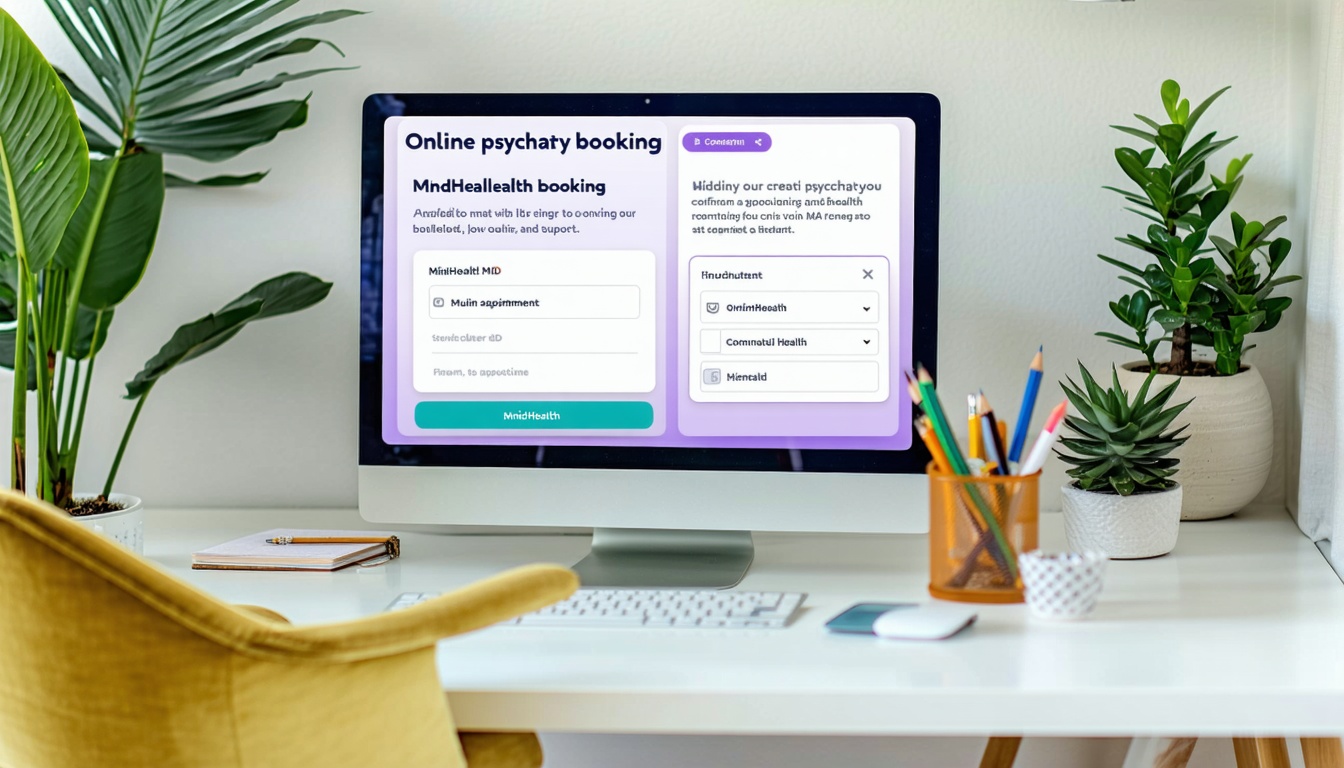Natural light is to a cozy apartment what thorough care is to your emotional well-being—it reveals dimensions you might not even know exist. If you or a loved one have both mental health and substance use challenges, then co occurring disorders treatment can make a world of difference. By addressing these issues together, you open the door to a healthier, more fulfilling life. MindHealth MD, a leader in telehealth psychiatry, Medication-Assisted Treatment (MAT), and Transcranial Magnetic Stimulation (TMS), is here to help you navigate every step.
In this post, you’ll gain insight into what co-occurring disorders really look like, how integrated treatment elevates recovery, and why MindHealth MD is an optimal partner for your journey. With thousands of adults experiencing both mental health and substance use issues (over 21 million in the U.S. alone, according to SAMHSA), you’re not alone. You deserve comprehensive care that meets you where you are and leads you where you want to go.
Understand co-occurring disorders
Co-occurring disorders, often called dual diagnosis, occur when you experience a mental health condition—like anxiety, depression, or bipolar disorder—alongside a substance use issue. Rather than existing as separate challenges, these two issues frequently feed into each other. For instance, if you struggle with anxiety, you might use alcohol or drugs to cope, which can worsen your mental health over time.
Statistics show a significant gap in care for those dealing with both mental health and substance use concerns. One report suggests that only 8% of individuals with co-occurring conditions receive integrated treatment for both (per NCBI Bookshelf). This means many people feel lost between traditional mental health services on one hand and substance use counseling on the other. That’s where a well-rounded co-occurring disorders treatment plan can be pivotal. By tackling both conditions through one comprehensive approach, you improve your odds of meaningful, long-term recovery.
Mental health and substance use link
It’s often tough to separate which issue came first—some people rely on drugs or alcohol to self-medicate psychological symptoms, while others develop depression, anxiety, or other mental health challenges because of substance use. You might find the line between the two is thin and ever-shifting. This is why integrated care is so vital. It ensures that underlying mental illnesses aren’t overlooked while also addressing the patterns of substance use that keep you stuck. You deserve an approach that sees the full you, rather than half the story.
Embrace integrated care
When you treat mental and substance use disorders in a silo, you end up missing crucial pieces of the recovery puzzle. Integrated care weaves both halves of the problem into one plan. From the moment you start treatment, professionals in both mental health and substance use fields collaborate on your case. This synergy leads to better outcomes, higher retention rates in programs, and a deeper sense of support.
According to data from the NCBI Bookshelf, integrated treatments produce measurable improvements in reducing substance use, alleviating mental health symptoms, boosting treatment satisfaction, and lowering overall costs. You might be less likely to drop out of treatment when you feel your providers understand both your mental health concerns and your particular struggles with alcohol or drug misuse. For many, that sense of comprehensive support can be the difference between relapse and genuine recovery momentum.
Why integration works
Integration works because it acknowledges that mental health disorders and substance use frequently share biological, psychological, and environmental roots. For example, stress triggers can lead to both a depressive episode and a substance craving. By tackling these stressors in one comprehensive plan, you learn healthy coping mechanisms that support both aspects of your recovery. Instead of feeling like you’re juggling two separate regimens, you can focus on a single, streamlined co occurring disorders treatment that keeps everything in sync and addresses your life holistically.
Discover telehealth psychiatry
Picture the flexibility of receiving professional support from the comfort of home or anywhere you have a reliable internet connection. This is what telehealth psychiatry offers. Rather than battling traffic or anxiety about leaving home, you can log into a secure video call for therapy, medication management, or consultations. Through telehealth, you bring crucial specialists and evidence-based practices directly to your doorstep.
Mental health treatment via online platforms can be especially useful if you live in a rural area, have mobility issues, or simply prefer the privacy of your own space. It’s also an excellent way to engage in more frequent check-ins, especially if you’re navigating a challenging period. If you need to discuss medication side effects, tapering strategies, or a sudden spike in cravings, you can often book a call more rapidly than waiting for the next in-person appointment.
Telehealth at MindHealth MD
At MindHealth MD, you can access a telepsychiatry appointment that feels more like a conversation with a trusted guide. You’ll meet board-certified psychiatrists and therapists who can tailor a co-occurring disorders treatment plan for your unique needs. From video-based psychosocial therapy to psychiatric medication management, everything is integrated to help you feel supported at every turn. The goal is to remove barriers to care and ensure you receive optimal treatment, even if you’re halfway across the country.
Explore medication-assisted treatment
Medication-Assisted Treatment, commonly called MAT, combines prescription medications with counseling and behavioral therapies. You might already know about MAT’s success in treating opioid dependencies using medications like buprenorphine or methadone. But MAT can also help with alcohol misuse, cravings, and withdrawal, which in turn makes it easier to focus on managing your mental health condition.
Why is MAT so effective? One reason is the way it stabilizes brain chemistry. When your physiologic balance is restored, you’re better able to engage in life tasks, attend therapy sessions, and manage everyday stress. For instance, if withdrawal symptoms kept you from working or concentrating in the past, alleviating those symptoms can free up mental and emotional energy. That energy can then be channeled into learning coping skills, building a healthy routine, and strengthening your resolve.
MindHealth MD’s MAT approach
MindHealth MD takes a client-centered approach with medication assisted treatment. By offering medications that are appropriate for your specific history, whether you’re dealing with opioid or alcohol misuse, the care team can help you reduce both cravings and the risk of relapse. These medications may be paired with therapy methods like motivational interviewing or cognitive behavioral sessions to foster long-term growth. If you have an opioid issue, you might also consider exploring mat for opioid addiction. Or, if alcohol dependency is a concern, mat for alcohol dependency might be the next step.
See how TMS helps
Transcranial Magnetic Stimulation (TMS) is an innovative therapy often used for hard-to-treat mental health conditions. TMS uses magnetic fields targeted at specific brain regions linked with mood regulation. If you’ve tried antidepressants without relief, TMS might provide a breakthrough pathway to feeling better.
While TMS is commonly used for depression, there’s growing interest in its potential to help individuals facing co-occurring disorders. For instance, if depression fuels or intertwines with your substance use, TMS can alleviate depressive symptoms, which might reduce the likelihood of turning to alcohol or drugs for relief. By incorporating TMS into a co-occurring disorders treatment plan, you give yourself yet another layer of support—one that focuses on rewiring the emotional and cognitive patterns that drive both mental health and substance use factors.
TMS at MindHealth MD
If you’re curious about TMS, MindHealth MD offers you a chance to schedule tms treatment without extensive hassle. The clinic’s team guides you through each step, from the initial consultation to follow-up sessions. Whether you struggle with persistent depression or a complex dual diagnosis, tms therapy for depression and other TMS-focused approaches can integrate seamlessly with telehealth psychiatry and MAT.
Count on MindHealth MD
Choosing the right treatment isn’t just about credentials or fancy titles—it’s about finding a provider you trust. MindHealth MD has experience with dual diagnosis psychiatric program options specifically designed for co-occurring conditions. The team’s holistic perspective ensures that MAT, TMS, and telehealth psychiatry aren’t scattered services. Instead, you receive a unifying plan that aligns your mental health support, substance use counseling, and, when necessary, medication.
Here’s what stands out about MindHealth MD:
- Multifaceted care: You get a balanced blend of therapy, medications, TMS, and ongoing assessments under one roof.
- Convenience: You can arrange a telepsychiatry appointment for therapy from anywhere with an internet connection.
- Expertise: Qualified professionals who keep up to date with the latest research in integrated care and co-occurring disorders.
An individualized partnership
Everyone’s background and story is distinct, and so is your response to treatment. That’s why MindHealth MD customizes care. If you find that certain medications aren’t working, they’ll adjust. If you need more thorough therapy sessions, they’ll schedule you accordingly. If TMS resonates with you, they’ll integrate that. This flexibility is essential in co occurring disorders treatment because no single method works for everyone. With MindHealth MD, you get a partner in recovery who adapts to your evolving needs.
Build a therapeutic alliance
Addressing co-occurring conditions involves a lot of trust. You’re putting your emotional health in someone else’s hands while also exploring deep-rooted substance use patterns. Providers at MindHealth MD understand this. They strive to cultivate a therapeutic alliance with you, ensuring that your insights, preferences, and concerns shape the care plan.
According to NCBI Bookshelf, building a trusting relationship between client and provider is crucial in co-occurring disorders treatment. It helps reduce stigma, mistrust, and low treatment engagement. You might wonder if you’ll be judged, especially if you’ve felt shame in the past. At MindHealth MD, the emphasis is on empathy, active listening, and non-judgmental support—making it easier to share your struggles openly.
Strategies for success
Some strategies used by professionals to fortify this alliance include motivational enhancement, relapse prevention techniques, and skill-building exercises that fit your lifestyle. For instance, if you have triggers at home, your therapist could walk you through mindful breathing exercises in a telehealth session, so you can practice them in real-time. When you see immediate, practical solutions, your faith in the therapeutic process grows.
Overcome typical barriers
Despite the clear benefits, people with co-occurring disorders often face a mix of challenges. You might worry you can’t afford care or that you’ll have to quit your job to accommodate frequent appointments. Common hurdles include a lack of understanding about what integrated treatment actually is, limited time, inconvenient clinic locations, and fear of being stigmatized. Yet each of these barriers has a potential solution.
For example, telehealth psychiatry conveniently bypasses location issues, letting you attend sessions from home. Insurance coverage often extends to telehealth visits, and MindHealth MD also accepts self-pay options for those who need flexibility. Plus, the center can guide you through specialized programs like in network psychiatry care, ensuring you receive coverage details up front. By demystifying the process and offering telehealth, MindHealth MD aims to reduce or remove many of the biggest roadblocks.
Addressing stigma and fear
Stigma around mental health or substance use can make it tough to even seek an initial consultation. Here’s the thing—you deserve professional support just as much as someone with a visible injury does. Co-occurring disorders aren’t defects of character; they’re medical conditions that respond to therapies, medication, social support, and TMS, among other interventions. Emphasizing compassion and normalizing dialogues about mental health can make it easier for you to step forward and say, “I need help.” The clinical team at MindHealth MD is here to stand firmly by your side, without judgment.
Take tangible steps forward
When the idea of integrated treatment resonates with you, the next question is how to get started. Here’s a straightforward path:
- Seek an initial consult: Request an appointment with MindHealth MD. In your first discussion—often a virtual psychiatry session—you’ll share your medical, psychological, and substance use history.
- Undergo an assessment: This might involve evaluations like an eeg brain mapping test to identify any neurological patterns. A thorough assessment shapes your personalized treatment strategy.
- Collaborate on a plan: You and your provider will work out which combination of telehealth therapy, MAT, TMS, and other resources suits you best.
- Stay consistent: Consistency is crucial in any co occurring disorders treatment plan. Embrace regular check-ins, therapy sessions, and medication reviews or modifications.
- Celebrate progress: Recovery is a journey. Recognize each milestone—like fewer cravings, improved mood, or better relationships—as evidence that you’re moving forward.
Ongoing support
Recovery doesn’t end when your official program wraps up. Ongoing maintenance—through therapy boosters, medication tune-ups, or process groups—remains key to long-term success. You can also stay alert to early warning signs of relapse, such as increased stress or a sudden shift in sleep patterns. When you notice these signals, it’s easier to schedule an extra substance use psychiatry service visit for prompt support. Remember that you’re not locked into a static plan; you can update it as you change and grow.
Frequently asked questions
Below are five common questions people search for when weighing co-occurring disorders treatment options. Hopefully, these answers give you added clarity.
Q1: Can therapy alone treat co-occurring disorders?
Therapy is a critical part of any treatment plan, but it may not be enough for everyone. Often, medications that address withdrawal, cravings, or mood fluctuations can enhance the benefits of behavioral sessions. An integrated approach—like combining MAT and therapy—tends to yield the best results.
Q2: How do I know if I have co-occurring disorders?
You might suspect co-occurring disorders if you’re struggling with mental health issues—like ongoing depression or anxiety—while using substances to cope. A thorough psychiatric evaluation will confirm your diagnosis. If you’re worried about the potential overlap, consider booking a dual diagnosis psychiatric program assessment to receive a professional opinion.
Q3: What should I expect during a telehealth psychiatry visit?
A telehealth psychiatry session often follows the same structure as an in-person visit. You’ll speak with a licensed professional about your symptoms, current medication, and overall progress. Providers can adjust prescriptions, discuss therapy goals, or recommend additional interventions like TMS. Just ensure you have a private, comfortable space with a strong internet connection.
Q4: Are TMS treatments safe and effective?
Yes. TMS therapy is FDA-cleared and has shown promising results, especially for treatment-resistant depression. Side effects are typically mild, such as slight headaches or scalp discomfort. When used in conjunction with a broader co-occurring disorders treatment strategy, TMS can help improve mood and, in some cases, reduce the drive to self-medicate with substances.
Q5: How long does integrated treatment usually last?
Treatment durations vary widely, depending on the severity of mental health symptoms and the level of substance use. Some people may find significant relief within a few months, while others may continue structured treatment for a year or longer. The key is consistent follow-up and re-evaluation of what’s working best for you.
Wrap up your journey
Your mental well-being isn’t just a single goal—it’s a continuous process that evolves, just like you. By embracing co occurring disorders treatment, you equip yourself with integrated strategies for managing anxiety, depression, or other conditions, alongside any substance use habit. You don’t have to face this complex challenge alone. MindHealth MD stands ready with telehealth psychiatry sessions, personalized Medication-Assisted Treatment, and cutting-edge TMS options to guide you toward a place of renewed stability.
If you’re ready to transform your life, consider scheduling an appointment soon. Building a healthy foundation—physically, mentally, and emotionally—is possible when you have the right support system in place. It starts with a single step, and that step might be as simple as reaching out for help. You’ve got a wealth of resources at your fingertips and a team that genuinely cares about your future. Whether it’s via telehealth, in-office visits, or specialized services, MindHealth MD ensures you’re never walking this path alone. It’s time to move toward the health, clarity, and confidence you deserve. Remember, your journey is uniquely yours, but expert help can make all the difference in lighting the way forward.








